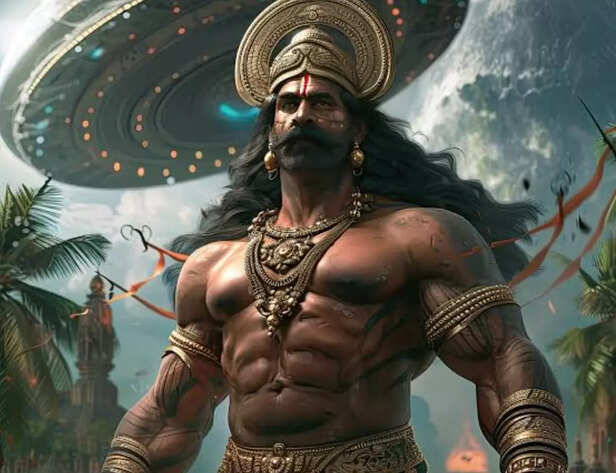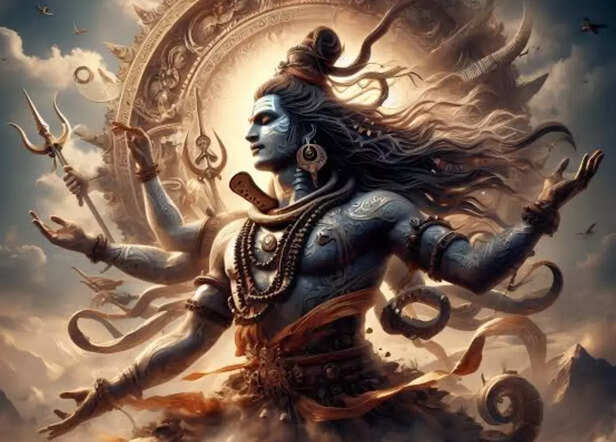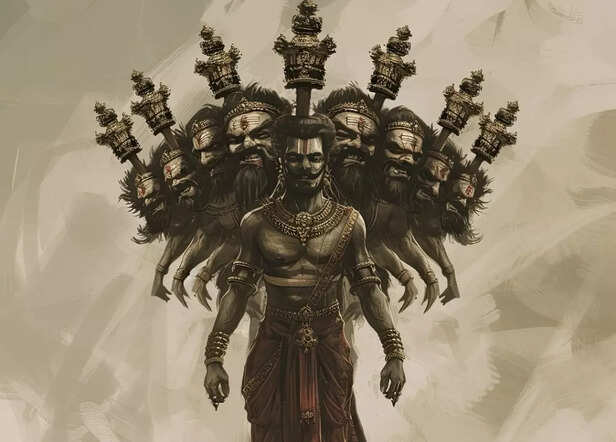Ravana—Often Remembered as the Villain of the Ramayana—Was a Master of Ayurveda and Author of the Ravana Samhita
Ankit Gupta | May 24, 2025, 17:55 IST
Ravana, the king of demons, was well versed with Ayurveda and had penned Ravana Samhita that talks about the science of Ayurveda. He was the greatest astrologer of his time, knew 64 different kinds ofert and had a deep understanding of the Vedas.
When one hears the name Ravana, the immediate image that arises in the collective consciousness is that of the villainous demon king of Lanka—the primary antagonist of the epic Ramayana. The towering ten-headed king who abducted Sita and waged war against Lord Rama has been etched into cultural narratives predominantly as the symbol of evil, arrogance, and adharma (unrighteousness). Yet, this portrayal barely scratches the surface of Ravana’s true essence. To reduce Ravana merely to a villain is to deny the vast reservoir of knowledge, devotion, and wisdom he embodied.
Ravana was no ordinary Rakshasa. He was a polymath, a supreme scholar, a master of Ayurveda, an eminent astrologer, a fierce devotee of Lord Shiva, and a profound exponent of Vedic wisdom. His life is a testimony to the complexity of human nature and the depth of Sanatan Dharma, which judges souls by their Karma (actions) and Gyan (knowledge), rather than by birth or simple moral binaries. This essay explores Ravana’s multifaceted personality, his contributions to Indian knowledge systems, and the spiritual lessons his life imparts, urging us to revisit our Itihaasa with greater depth and understanding.

The name Ravana literally means "the one who roars" or "one who causes a terrifying sound." He was born into the Rakshasa clan but was no ordinary demon by birth. His lineage traces back to sage Pulastya, making him a Brahmin by heritage, which explains his deep immersion in Vedic and spiritual knowledge. Despite his demon status, Ravana was a man of extraordinary intellect, mastery, and power.
One of the most compelling facets of Ravana’s identity is his role as an Ayurvedic scholar. He is credited with authoring the Ravana Samhita, an ancient treatise on Ayurveda, which still holds significance for practitioners of traditional Indian medicine. This text delves into various healing techniques, herbal medicines, and therapies, showing Ravana’s deep understanding of the human body and health.
Ayurveda, the science of life and longevity, requires rigorous study and mastery of complex concepts like the balance of doshas (body energies), the effects of herbs, and intricate diagnosis methods. Ravana's scholarship in this field underscores his status as not merely a warrior or king, but as a healer and protector of life.
According to legend, Ravana was a master of the 64 kalas—a comprehensive list of arts and sciences ranging from music, dance, literature, astrology, warfare, statecraft, to various spiritual practices. This mastery reflects an ancient ideal of holistic education, where rulers were expected to excel in diverse disciplines, blending art, science, and spirituality. Ravana’s proficiency in these arts earned him reverence even from the gods and sages, who acknowledged his brilliance despite his demon nature.
Beyond Ayurveda, Ravana was the greatest astrologer of his time. Astrology (Jyotisha) in Sanatan Dharma is not merely about predicting events but understanding the cosmic rhythms that govern existence. Ravana's deep grasp of astrology allowed him to weave intricate knowledge of time, planetary influences, and human destiny.
The Ravana Samhita also contains astrological wisdom, blending medicine and cosmic science, revealing the integral nature of health, time, and celestial forces. It is said that his understanding of the Vedas was profound, and he could chant and interpret complex Vedic hymns with clarity and insight. His scholarship made him a Brahma-gyani—one who has realized Brahman, the ultimate cosmic reality.

Ravana was not only a scholar but a fervent devotee of Lord Shiva. His intense devotion and penance earned him divine boons. The epic Shiva Purana recounts how Ravana once lifted Mount Kailash, Shiva’s abode, and how the Lord subdued him with a mere press of his toe, leaving Ravana humbled yet inspired.
His deep connection to Shiva symbolizes the ideal of surrender and spiritual aspiration. Despite his flaws, Ravana’s devotion exemplifies that even those who falter morally can strive for spiritual heights. He is often portrayed playing the veena, singing hymns in praise of Shiva, emphasizing his artistic and spiritual sophistication.

The Ramayana is often simplified into a narrative of good versus evil, with Rama representing virtue and Ravana embodying vice. But Sanatan Dharma, unlike many rigid moral systems, embraces complexity and ambiguity. Ravana’s life illustrates that the same individual can embody brilliance and flaw, devotion and arrogance, wisdom and folly.
Ravana’s downfall is attributed to his ego and unchecked desires. His abduction of Sita was a grave mistake driven by lust and pride, which set the cosmic drama of the Ramayana in motion. However, his strength, knowledge, and devotion also teach us vital lessons:
Despite being cast as the villain in popular retellings, Ravana remains a figure of respect in many traditions.
In certain parts of India and Sri Lanka, Ravana is revered as a hero and a great king who upheld justice and prosperity. Folk songs and regional versions of the Ramayana sometimes portray him in a sympathetic light, focusing on his virtues and tragedies rather than his defeat.
Practitioners of Ayurveda and astrology continue to study the Ravana Samhita, valuing it as a precious repository of ancient knowledge. It reflects how the wisdom of the past transcends myth and offers practical guidance for health and cosmic understanding.
Ravana’s story urges us to approach our ancient epics not as simplistic tales of good versus evil but as profound reflections on human nature and cosmic order. His life teaches us:
Ravana was no ordinary Rakshasa. He was a polymath, a supreme scholar, a master of Ayurveda, an eminent astrologer, a fierce devotee of Lord Shiva, and a profound exponent of Vedic wisdom. His life is a testimony to the complexity of human nature and the depth of Sanatan Dharma, which judges souls by their Karma (actions) and Gyan (knowledge), rather than by birth or simple moral binaries. This essay explores Ravana’s multifaceted personality, his contributions to Indian knowledge systems, and the spiritual lessons his life imparts, urging us to revisit our Itihaasa with greater depth and understanding.
The King of Lanka and the Embodiment of Knowledge

A Scholar
( Image credit : Pixabay )
The name Ravana literally means "the one who roars" or "one who causes a terrifying sound." He was born into the Rakshasa clan but was no ordinary demon by birth. His lineage traces back to sage Pulastya, making him a Brahmin by heritage, which explains his deep immersion in Vedic and spiritual knowledge. Despite his demon status, Ravana was a man of extraordinary intellect, mastery, and power.
One of the most compelling facets of Ravana’s identity is his role as an Ayurvedic scholar. He is credited with authoring the Ravana Samhita, an ancient treatise on Ayurveda, which still holds significance for practitioners of traditional Indian medicine. This text delves into various healing techniques, herbal medicines, and therapies, showing Ravana’s deep understanding of the human body and health.
Ayurveda, the science of life and longevity, requires rigorous study and mastery of complex concepts like the balance of doshas (body energies), the effects of herbs, and intricate diagnosis methods. Ravana's scholarship in this field underscores his status as not merely a warrior or king, but as a healer and protector of life.
The Master of 64 Arts (Chatushashti Kalas)
Ravana the Astrologer and Vedic Scholar ji
The Ravana Samhita also contains astrological wisdom, blending medicine and cosmic science, revealing the integral nature of health, time, and celestial forces. It is said that his understanding of the Vedas was profound, and he could chant and interpret complex Vedic hymns with clarity and insight. His scholarship made him a Brahma-gyani—one who has realized Brahman, the ultimate cosmic reality.
Devotion to Lord Shiva

Shiva Mystic
( Image credit : Pixabay )
Ravana was not only a scholar but a fervent devotee of Lord Shiva. His intense devotion and penance earned him divine boons. The epic Shiva Purana recounts how Ravana once lifted Mount Kailash, Shiva’s abode, and how the Lord subdued him with a mere press of his toe, leaving Ravana humbled yet inspired.
His deep connection to Shiva symbolizes the ideal of surrender and spiritual aspiration. Despite his flaws, Ravana’s devotion exemplifies that even those who falter morally can strive for spiritual heights. He is often portrayed playing the veena, singing hymns in praise of Shiva, emphasizing his artistic and spiritual sophistication.
The Complexity of Ravana’s Character

Beyond Good and Evil
( Image credit : Pixabay )
The Ramayana is often simplified into a narrative of good versus evil, with Rama representing virtue and Ravana embodying vice. But Sanatan Dharma, unlike many rigid moral systems, embraces complexity and ambiguity. Ravana’s life illustrates that the same individual can embody brilliance and flaw, devotion and arrogance, wisdom and folly.
The Tragic Flaws and Lessons of Ravana
- The Danger of Hubris: Despite his vast knowledge, Ravana’s ego blinded him to dharma (righteous conduct).
- The Power of Karma: No matter one’s learning or power, actions aligned with adharma lead to downfall.
- The Potential for Redemption: His devotion to Shiva shows that the path to God is open to all, regardless of their flaws.
Ravana’s Legacy in Indian Thought and Culture
In certain parts of India and Sri Lanka, Ravana is revered as a hero and a great king who upheld justice and prosperity. Folk songs and regional versions of the Ramayana sometimes portray him in a sympathetic light, focusing on his virtues and tragedies rather than his defeat.
Practitioners of Ayurveda and astrology continue to study the Ravana Samhita, valuing it as a precious repository of ancient knowledge. It reflects how the wisdom of the past transcends myth and offers practical guidance for health and cosmic understanding.
Reclaiming the Depth of Our Itihaasa
- To value knowledge and devotion beyond superficial judgments.
- To recognize the complexity of dharma, which transcends easy binaries.
- To honor the richness of Sanatan Dharma, which embraces contradictions as part of the whole truth.
